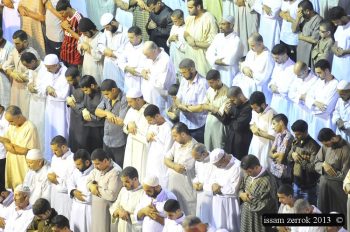Arab’s Routine in Ramadhan Posted by Ibnulyemen اِبْنُ اليَمَن on Jun 1, 2017 in Culture, Vocabulary
Arabs always await the Holy Month of Ramadhan eagerly. Besides its religious status, it is when they work less and sleep more during daytime, eat a wider variety of food, and enjoy watching special and diverse drama series on television.
Religiously, Arabs are more observant during Ramadhan for it is termed the month of mercy and forgiveness. They pray in congregati1on and at the regular prayer times. Also, they, particularly the Sunnis, pray Tarawih prayers (صَلاةُ التَّرَاوِيْح)— voluntary extra congregational prayers performed after Isha’a Prayer (صَلاةُ العِشَاء). During the last ten days of Ramadhan, some pray Tahajjud Prayers (صَلاةُ التَّهَجُّد)—other voluntary extra congregational prayers performed after mid night. Besides fasting and praying, they strive to read as many chapters of the Quran and as many times as they could. What’s more, they give alms and seek to help those in need as often as they could.
Normally, working hours are reduced to half compared to regular non-Ramadhan days. For example, in Yemen, the average working hours during other months of the years are seven hours, whereas in Ramadhan they are reduced to three and a half hours, between 10.00 am and 2.00 pm.
Since night time, from sunset to dawn, is spent on various religious, social and entertainment activities, they sleep more during the day, especially early mornings and later afternoons. Many people take Ramadhan off, and as a result, they sleep from dawn till early afternoon. For this reason, it is not surprising to see the streets of Sana’a, Amman, Cairo, or Rabat completely empty till midday and vibrant from the afternoon till dawn.
A great deal of attention and money is dedicated to food during Ramadhan. Most Arabs start financial planning for Ramadhan months ahead. For instance, in some Arab countries, especially Gulf States, 20% of average family income is dedicated to Ramadhan. At the call to prayer, Maghreb Prayer (صَلاةُ المَغْرِب), people usually break their fast with dates and water or milk in mosques. Following Maghreb Prayer, or Isha’a in some countries, they have their heavy dinner which is, nutritionally speaking, high in fat, sugar, carbohydrate, and protein.
Take the case of Morocco. Moroccans start with harirah حَرِيْرَة, soup made up of chickpeas, lentils, ground beef or chicken, parsley, coriander, tomato paste, celery, and some rice grains. Ramadhan dessert includes al-shibbakiyah الشِّبَاكِية or al-sifoof السِّفُوف, both of which are pastry. The main dish includes Tagine طَاجِيْن of meat, fish, or chicken and couscous كُسْكُس.
Following Isha’a or Tarawih prayers, families across the Arab World spend the night watching dramas till pre-dawn meal سَحُوْر time. With free access to satellite channels, they can watch any series they are interested in. Egyptian and Syrian dramas are by far the most popular. They are watched in almost every home.
So, what is a typical Ramadhan like for men?
Successively, starting at sunset:
- People break their fast at the call for prayer mostly in mosques for men,
- pray Maghreb Prayer and return to their homes,
- (in most countries) have dinner and drink tea or coffee as they wait for Isha’a Prayer (صَلاةُ العِشَاء),
- At the call for Isha’a Prayer, they go back to mosques (the majority), pray Isha’a, some return to their homes and other continue with Tarawih Prayer
- the session of entertainment and watching TV starts:
- some watch TV with their families till very late at night
- others play games such playing cards, chess, or domino
- some others smoke shishah and socialize with friends
- some work
- an hour before pre-dawn meal, they have their meals and go to mosques for Dawn Prayer
- following the prayer, they go back home and sleep late depending on the type of work they do.
- At the call for prayers (Midday Prayer ظُهْر and Afternoon Prayer عَصْر), the majority go to mosques for prayers.
- Between Afternoon Prayer and the time for breaking the fast, they do various activities and chores, among which could be sleeping.
- For most, Quran reading is normally done 15-30 minutes before and after each prayer, except after Maghreb Prayer, which they are excited to enjoy their dinner, and Dawn Prayer, when they are exhausted owing to staying up all night.
- Women do similar things, except for going to Mosques; besides, they enjoy their favorite hobby—spend fun and artful time in the kitchen.
Greetings from Yemen, Happy Ramadhan, and May It Be a Month of Mercy and Forgiveness, Ameen!
Vocabulary and expressions:
- Holy Month of Ramadhan شَهْرُ رَمَضَان المُبَارَك
- daytime نَّهَار
- mercy رَحْمَة
- forgiveness مَغْفِرَة
- prayer times أَوْقَاتُ الصَّلاة
- congregational prayer صَلاةُ الجَمَاعَة
- fasting صَوْم ، صِيَام
- praying صَلَاة
- alms صَدَقَة
- working hours سَاعَات العَمَل
- sunset غُرُوْبُ الشَّمْس
- dawn فَجْر
- Gulf States دُوَلُ الخَلِيْج
- chickpeas حُمُّص
- lentils عَدَس
- ground beef لَحْم مَفْرُوم
- chicken دَجَاج
- parsley بَقْدُونِس
- coriander كَزْبَرَة
- celery كَرَفَس
- Arab World الوَطَن العربي ، العَالَم العَرَبِي
- satellite channels قَنَوَات فَضَائِيَّة
- call for prayer أَذَان
- playing cards كُوتِشِنَة in Egypt and Syria and neighboring countries, بَطَّة in Yemen and Gulf States
- chess شَطْرَنج
- domino دُوْمُنَة or دُومِيْنُو

Build vocabulary, practice pronunciation, and more with Transparent Language Online. Available anytime, anywhere, on any device.







Comments:
shaks:
Thanks for the informative article!:) in non-islamic countries women DO go to mosques for the same activities as men. Ramadan Mubarak.